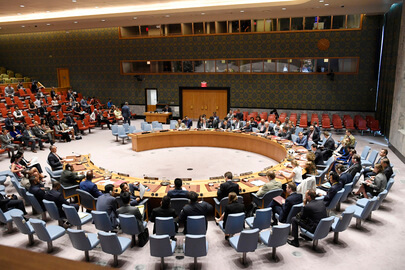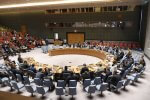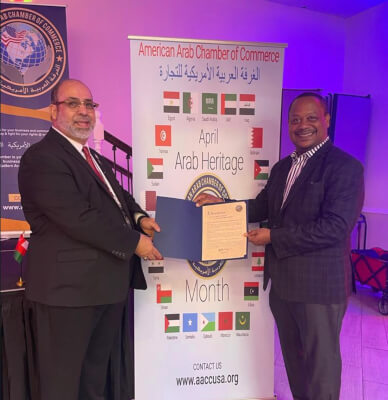![]()
Accurate look at UN Human Rights, devoid of Nikki Haley’s racism
Despite the lies and propaganda of racist, bigoted American UN Ambassador Nikki Haley that the UN Human Rights Council only focuses on Israel, the outgoing UN High Commissioner for Human Rights Zeid Ra’ad Al Hussein offers insight into the Council’s positions on a wide range of issues that go beyond Israel’s war crimes and immoral atrocities. But Haley doesn’t care about accuracy, truth or facts. A fascist, Haley only cares about protecting political allies who are engaged in human rights violations. What else can you expect from an American administration that separates children from their mothers?
Opening statement and global update of human rights concerns by UN High Commissioner for Human Rights Zeid Ra’ad Al Hussein at 38th session of the Human Rights Council
18 June 2018
Mr. President,
Excellencies,
Distinguished Delegates,
Colleagues and Friends,
As this is my last global update to the Human Rights Council in a regular session – and before I turn, once again, to the important matter of access and cooperation – I wish to draw on some final reflections.
I heard recently a UN official telling others there is really no such thing as universal human rights, musing that they were picked from a Western imagination. I remember thinking to myself that the Universal Declaration of Human Rights – the most translated document in the world – was negotiated by the same political leaders who poured universal values into the Charter, creating the United Nations. Is the UN also then somehow not universal? Were its values sourced only from a Western tradition – unrepresentative of the rest of the world?
No. A clear rejection of this comes from a look at the negotiating record itself. The San Francisco Conference, which established the UN, was a circus of sound shaped from many tongues; its result was not a solo tune from a Western instrument. Had that been the case – had the countries that joined the organization believed they were being pinned to alien, Western values – why then did they not stream toward the exits? Why did they not withdraw from the UN?
But then why is the Universal Declaration, and the whole body of human rights law that followed it, the object of so much attack now –- not only from the violent extremists, like the Takfiris, but also from authoritarian leaders, populists, demagogues, cultural relativists, some Western academics, and even some UN officials?

I have spent most of my career at, and in, the UN. What I have learned is this: the UN is symptomatic of the wider global picture. It is only as great or as pathetic as the prevailing state of the international scene at the time. I also have come to understand how weak human memory is. That to many people history matters only in so far as it can be unsheathed and flung into political battle: they do not view it as a service to deeper human understanding.
There is a dangerous remove and superficiality to so many of our discussions, so much so that the deepest, core issue seems to have been lost on many.
Is it not the case, for example, that historically, the most destructive force to imperil the world has been chauvinistic nationalism – when raised to feral extremes by self-serving, callous leaders, and amplified by mass ideologies which themselves repress freedom. The UN was conceived in order to prevent its rebirth. Chauvinistic nationalism is the polar opposite of the UN, its very antonym and enemy. So why are we so submissive to its return? Why are we in the UN so silent?
The UN’s raison d’être is the protection of peace, rights, justice and social progress. Its operating principle is therefore equally clear: only by pursuing the opposite to nationalism – only when States all work for each other, for everyone, for all people, for the human rights of all people – can peace be attainable.

Why are we not doing this?
Those of us in the UN Secretariat, originating from all the 193 Member States, work collaboratively and we do not answer to any State. In contrast, too many governments represented at the UN will often pull in the opposing direction: feigning a commitment to the common effort, yet fighting for nothing more than their thinly-thought interests, taking out as much as they can from the UN, politically, while not investing in making it a true success. The more pronounced their sense of self-importance – the more they glory in nationalism – the more unvarnished is the assault by these governments on the overall common good: on universal rights, on universal law and universal institutions, such as this one.
And as the attack on the multilateral system and its rules, including most especially international human rights law, intensifies, so too will the risk increase of further mischief on a grander scale. The UN’s collective voice must therefore be principled and strong; not weak and whining, obsessed with endless wrangling over process, the small things, as it is the case today.
If my Office, of which I am very proud, and I, have gotten one thing right over the last few years, it is our understanding that only fearlessness is adequate to our task at this point in time. Not ducking for cover, or using excuses or resorting to euphemisms, but a fearlessness approaching that shown by human rights defenders around the world – for only by speaking out can we begin to combat the growing menace of chauvinistic nationalism that stalks our future.
I appeal to you to do more, to speak louder and work harder for the common purpose and for universal human rights law, to better our chances for a global peace.
This Council session will consider numerous essential issues. Among them, you have before you the report of my Office on Kashmir, and the coming report on Venezuela; you will also be informed of the findings of the Team of Experts on the Kasai regions of the Democratic Republic of the Congo. And as I transition out of my position, the Office will continue its work on the database of business enterprises engaged in specific activities related to Israeli settlements, as called for by the Council, with an update possibly before September. At the September session, the Fact-Finding Mission report on Myanmar will be presented to the Council, alongside the report of the Special Rapporteur on Myanmar; and you will also receive the report on Yemen prepared by the eminent international experts. In that context, I emphasize my grave worry regarding the Saudi and Emirati-led coalition’s on-going attacks in Hodeida – which could result in enormous civilian casualties, and have a disastrous impact on life-saving humanitarian aid to millions of people which comes through the port.
Mr President,
Twice in the course of my mandate, I have reported on the troubling failure by a number of countries to grant access, and I will do so again today. These refusals of access constitute a serious affront to our work, and where there is sustained denial of access, and serious reasons to believe violations are occurring, we will consider the option of remote monitoring. The Office’s mandate to conduct such monitoring is unassailable, and if the Government concerned fears there may be inaccuracies it should permit us in to see the situation on the ground.
Mr President,
In Syria, the leadership’s contempt and disregard for human rights was what laid the ground for this conflict, and fuelled it for the first year at least. The horrific violations and abuses committed since then – principally by the government and its allies, but including also the violent extremists and their supporters – have destroyed much of the country along with many of its people. Both my Office and the Council’s Commission of Inquiry have been refused access to all regions. The Government’s recent, selective acceptance of one Rapporteur’s visit, when so many other requests have been outstanding for an extended period, is in no way an adequate stand-in for compliance with this Council’s resolutions S18-1 and 19/22, which call for full cooperation with my Office and the establishment of a field presence. Our extensive remote monitoring of human rights violations in Syria will continue.
In Myanmar, as the Council is aware, there are clear indications of well-organised, widespread and systematic attacks continuing to target the Rohingyas in Rakhine State as an ethnic group, amounting possibly to acts of genocide if so established by a court of law. In Kachin and northern Shan States, conflict has again escalated since October last year, and longstanding and widely reported human rights violations in the country include allegations of extrajudicial killings; enforced disappearances; torture and inhuman treatment; rape and other forms of sexual violence; forced labour; recruitment of children into armed forces; and indiscriminate or disproportionate attacks arising from conflicts between security forces and armed groups. Although Myanmar has stated that it will investigate allegations and prosecute alleged perpetrators, its actions to date have not met minimal standards of credibility or impartiality. Due to continuing refusals to permit access, OHCHR, the country Special Rapporteur and the Fact-Finding Mission have conducted remote monitoring. In the context of the MOU that the Government of Myanmar has established with UNDP and UNHCR for the repatriation of Rohingya refugees from Bangladesh, I reiterate that no repatriation should occur in the absence of sustained human rights monitoring on the ground, in the areas concerned.
Given the gravity and scope of the human rights violations in Venezuela, and continuing denial of access to the Office, we will continue remote monitoring and reporting; our second report will be published in the coming days – and we firmly believe the Council needs to establish a Commission of Inquiry. Since last June the Government has issued three invitations to the Special Procedures, the first since 1996. However, the authorities have ignored a long list of requests by others whose mandates are particularly relevant to the current human rights crisis in the country.
Despite Burundi‘s agreement to cooperate with the Team of Experts mandated by the Council last year, the Team was expelled from the country last month and has not been able to return. Access is also denied to the International Commission of Inquiry set up in 2016, and the authorities have refused to finalize discussions on the renewal of the MOU with my Office. Meanwhile, the human rights situation continues to deteriorate throughout the country. The Government’s continuing restrictions on civic space, and its decision to revise the Constitution through a referendum last month, have generated a host of human rights concerns – including at least 44 alleged cases of arbitrary arrest and detention – and may further deepen grievances. I strongly encourage the Government to re-establish engagement with all international human rights bodies.
I have sought to engage substantively with both India and Pakistan over the past two years regarding the situation in Kashmir, on both sides of the Line of Control. Refusals by both India and Pakistan to enable unconditional access have led us to conduct remote monitoring, with a first report issued last week. I encourage the Council to consider establishing a Commission of Inquiry for a more comprehensive investigation of the human rights situation in Kashmir, and reiterate my calls for access. I am tremendously saddened by the assassination last week of Shujaat Bukhari, a courageous human rights defender actively working for peace, including through his participation in the Track Two diplomacy seeking to help both India and Pakistan put an end to the violence.
In Nicaragua, anti-government protests over the past two months have led to the killing of at least 178 people, almost entirely at the hand of the police forces and by armed pro-government groups, including allegedly the use of snipers, with at least 1,500 wounded. This is in addition to reported abductions and disappearances. I deplore the violence, including the horrific arson attack two days ago. The gravity of these developments may well merit an international commission of inquiry. I expect the commitments made at the resumption of the National Dialogue on 15 June to be upheld, including the cessation of all forms of violence and threats thereof, and the commitment to extend an urgent invitation to OHCHR to visit the country, as we have repeatedly requested. This invitation should be sent without delay.
In the Democratic People’s Republic of Korea, remote monitoring by my Office has found little change in the country’s longstanding, grave and systematic violations of human rights. The people of the DPRK risk their lives and their dignity for the exercise of their fundamental human rights, including seeking to leave the country and communicating with individuals abroad. While I regret the persistent lack of cooperation with the country mandate-holder, the DPRK’s recent engagement with the human rights mechanisms, through one Special Rapporteur visit and treaty body reviews, is encouraging. I call on the authorities to step up that engagement significantly, and without selectivity, including cooperation with the country mandate. The experience of my Office has repeatedly demonstrated that making human rights part of peace talks contributes to meaningful and sustainable peace in the long-term. Our door remains open for greater engagement and cooperation.
Israel continues to deny access to the Occupied Palestinian Territory by the Special Rapporteur on the Situation of human rights in the Palestinian territory occupied since 1967. This has been the case for three successive holders of the mandate. Access has also been denied to all of the Council’s previous Commissions of Inquiry, including on Gaza in 2014. I believe the Council’s advocacy of impartial monitoring and expert recommendations is entirely justified by the gravity of the situation, and I urge Israel to provide access to all human rights mechanisms – including the investigative body mandated last month – to enable impartial monitoring and advance accountability and justice.
In China, despite efforts by my Office to establish conditions conducive to an effective dialogue, my staff have not been given unfettered access to the country, including to the Tibetan Autonomous Region and the Xinjiang Uyghur Autonomous Region, where the human rights situation is reportedly fast deteriorating. Moreover, although two mandate-holders have visited the country in the past five years, China has in that period accumulated more than 15 pending requests for visits. I am, furthermore, dismayed by China’s continuing efforts to prevent independent members of civil society from engaging with human rights mechanisms, including Treaty Body reviews, this Council’s UPR, and many mandate-holders. I encourage the authorities to enable all actors to contribute to all the international human rights mechanisms, and to cooperate with them in a spirit of open and mutual partnership, in order to improve respect for the rights and freedoms of China’s people.
Regarding the situation in Turkey, an invitation for the High Commissioner to visit Ankara is not a substitute for access for the Office to directly and objectively assess the situation in the South-East, where the authorities have consistently failed to conduct credible criminal investigations into the civilian deaths which occurred during security operations in 2015 and 2016. In the absence of adequate access, the Office will continue remote monitoring of the situation. I note that Turkey received visits relating to torture, freedom of expression and enforced disappearances in 2016, and encourage the government to allow further visits in the near future.
Unconditional access to Bahrain continues to be refused to my Office and the Special Procedures, amid continued crackdowns on civil society and additional legislation which further restricts the people’s fundamental rights. I encourage the Kingdom to reverse these profoundly damaging trends and to facilitate effective engagement with the international human rights mechanisms. My Office stands ready to provide technical and legal expertise.
I deeply regret that there has been no progress regarding access for the Office to all protracted conflicts in the South Caucasus, to enable us to assess people’s human rights needs and assist in addressing protection gaps. In addition, to date, access has not been granted by the authorities in control under the framework of this Council’s resolutions 34/37 and 37/40 on cooperation with Georgia.
In South Sudan, I acknowledge and welcome the Government’s cooperation with this Council’s Commission on Human Rights in South Sudan. However, in violation of the Status of Forces Agreement, human rights officers working with UNMISS have been regularly denied access to locations where serious human rights violations and abuses are allegedly committed, impeding UNMISS’s mandated task of monitoring the human rights situation. These include facilities run by the National Security Service, where hundreds of people are believed to be arbitrarily detained in conditions that could amount to torture. I am deeply concerned about the intensification of indiscriminate attacks against civilians, particularly a pattern of rapes and killings perpetrated by Government forces and their proxies in Unity State since April 2018. Human rights officers have documented the rape of children as young as four years old, and numerous cases of women, elderly people and others being hanged or burned alive in what appears to be a deliberate scorched-earth policy.
I welcome Security Council resolution 2414 (2018) on Western Sahara, which strongly encourages enhancing cooperation with OHCHR. I reiterate the readiness of my Office to undertake as soon as possible a follow-up technical mission to Western Sahara.
I am concerned by the suspension of a visit to Rwanda by the Sub-Committee on the Prevention of Torture late last year, due to serious obstruction regarding access to some places of detention; the confidentiality of interviews; and concerns about potential reprisals. The SPT decided to resume the visit in 2018, but there has been no positive engagement with the authorities. I call on them to provide full cooperation so that the Sub-Committee can fulfil its important mandate.
In Indonesia, I am concerned that despite positive engagement by the authorities in many respects, the Government’s invitation to my Office to visit Papua – which was made during my visit in February – has still not been honoured.
Bangladesh has granted extensive and commendable access to the Office and all relevant human rights mechanisms with respect to the Rohingya refugee crisis. However, it has more than 10 outstanding requests for visits by mandate holders to assess the human rights situation in Bangladesh itself. I encourage greater engagement, particularly with respect to concerns about the shrinking space for civil society, and allegations of extrajudicial actions by the security forces.
In Mexico, despite a positive record of openness which we deeply appreciate, I regret the lack of access for the Committee on Enforced Disappearances, despite repeated requests under article 33 of the Convention. Since 2012, the Committee has registered over 310 urgent actions on cases of enforced disappearances in the country, which represent more than 60 per cent of all urgent actions registered to date.
In Cameroon, I trust that recent promising discussions with the authorities will swiftly lead to approval for a mission by the Office to all parts of the country. To date this access has been refused, despite the growing crisis in the Anglophone regions, with fighting between up to a dozen armed groups and the security forces. We have received reports of abuses and violations by all sides, including burning of schools and private property; mass arrests and arbitrary detentions; and the use of torture and excessive force by security personnel, leading to the displacement of 150,000 people within the country and over 20,000 to neighbouring Nigeria.
On Crimea, we have repeatedly asked the Russian Federation for access, in line with the General Assembly’s requests. Special Procedures mandate-holders have also sought to visit Crimea, most recently the Special Rapporteur on Torture. The Russian Federation’s replies, while incompatible with GA resolutions 68/262, 71/205 and 72/190, nonetheless recognize that international human rights mechanisms must extend their reach to Crimea. I hope these encouraging responses can pave the way for additional steps to enable our access, in the interests of the human rights protection of the people of the region.
Mr President,
Almost 40 States have received no visit by a Special Rapporteur over the past five years, despite requests. Among them, 15 States have more than five pending visits: Bahrain, Belarus, Bolivia, Colombia, Democratic Republic of the Congo, Egypt, Ethiopia, Iran, Jamaica, Nicaragua, Pakistan, Turkmenistan, Uganda, Yemen and Zimbabwe.
There is also no exception to the requirement of cooperation for States in disagreement with the majority of Council members: indeed such an approach would eviscerate the meaning of the Council’s decisions. I deplore the openly voiced refusal of a number of States to cooperate with this Council’s Independent Expert on sexual orientation and gender identity. Notably, the Russian Federation has formally refused to respond to any communications from the mandate-holder, including joint submissions with other experts mandated by the Council, despite serious allegations of violence, discrimination and exclusion of members of the lesbian, gay, bisexual and transgender community, especially in Chechnya.
In many States, LGBTI people face severe and often official discrimination; and almost everywhere, they are inadequately protected from violence and bigotry. Protecting all human beings, including the LGBTI community, is not “outside” the international legal framework; ending discrimination and violence for everyone, everywhere, is absolutely central to our principles and work.
Mr. President,
At the same time, I am pleased to note a number of positive developments with respect to access for the Special Procedures. These include an increased response rate to communications, now at 68 per cent (an increase of 13 per cent over 2016); and Afghanistan’s issuance of a standing invitation to all mandate-holders, taking the number of States having done so to 118 UN Member States and one non-member Observer State. I note and commend the following States which have hosted at least five visits by thematic mandates in the last five years: Argentina, Australia, Azerbaijan, Brazil, Chile, Georgia, Ghana, Greece, Honduras, Italy, Kazakhstan, Mexico, Republic of Korea, Serbia, Sri Lanka, Tunisia, Ukraine, the UK and the US.
Regarding engagement with the Treaty Bodies, I welcome long-outstanding reports to the Committees by Bangladesh, Cabo Verde, Central African Republic, Guinea, Mali, Mauritania, Niger, Tonga and Zambia. Allow me also to applaud Qatar’s accession to the Covenants and Afghanistan’s accession to the Optional Protocol to the Convention against Torture and Other Cruel, Inhuman or Degrading Treatment or Punishment, alongside many other ratifications. My Office stands ready to support them in efforts to implement these commitments to ensure respect for their people’s rights, and I urge other countries which have not ratified these and other human rights treaties to do so.
Mr President,
In a number of areas, I am heartened by significant progress regarding access.
During my second mission to Ethiopia, in April, I was impressed and encouraged by the Prime Minister’s commitment to undertake reforms that could well advance the rule of law, and respect for fundamental human rights and principles, including a broad space for expression, peaceful assembly and civil society participation. Following a long period of reluctance to engage with international human rights bodies, the recent conclusion of a much-awaited MOU will facilitate an extensive role for the Office in the country, and I encourage the authorities to also accept visits by and guidance from Special Procedures experts in the context of the ongoing reforms. I applaud the lifting of the state of emergency earlier this month, as well as the release of a number of political detainees. While recognising challenges, I look forward to assisting the authorities in furthering respect for the human rights of all in Ethiopia.
I welcome Armenia’s recent decision to enable the Office to contribute more effectively to upholding the rights of Armenia’s people, including its invitation to provide technical assistance through presence of our staff on the ground.
I again commend Tunisia for its extensive cooperation with the Office and Special Procedures, and its establishment of a national monitoring and reporting framework to strengthen engagement with the Treaty Bodies. OHCHR has unconditional access to all areas of the country, including to prisons, and the official visit of 12 mandate-holders has been fully facilitated by the Government since it extended a standing invitation to the Special Procedures in 2011.
In Moldova, my Office and mandate-holders have recently been given access to the Transnistria region. I am hopeful that we will see deeper engagement with the Office and the UN, and I encourage other States in a similar context, in Europe and worldwide, to review and build on these good practises.
Breaking with 15 years of refusals of visits by the Special Procedures, Uzbekistan received the mandate-holder on freedom of religion or belief in October 2017, and in May, Parliament adopted a roadmap on implementing his recommendations. The UN Country Team has also received the government’s approval for a project by UNDP supporting follow-up to UPR recommendations, and I understand that the authorities have rolled back a number of restrictions on civil society activity.
Libya, following my visit to Tripoli in October, accepted its first ever mission from a mandate holder, the Special Rapporteur on the Human Rights of Internally Displaced Persons, and other mandate-holder visits are planned, should the security situation allow. Libya has also co-sponsored this Council’s Resolution 37/45, which encourages monitoring and reporting by UNSMIL on human rights violations and abuses in the country and calls for cooperation with human rights mechanisms. The recent decision to redeploy UN staff to Tripoli should also open the door for greater access across the country.
The Council may also wish to note the deployment of Human Rights Advisors to Belarus and Zimbabwe, two countries where there have been access issues in the past.
Mr President,
People do not lose their human rights by virtue of crossing a border without a visa. I deplore the adoption by many countries of policies intended to make themselves as inhospitable as possible by increasing the suffering of many already vulnerable people. In recent weeks, I have become increasingly alarmed by two issues regarding access for civil society organisations to migrants.
In Hungary, I am deeply concerned about a bill presented to Parliament last month which, if adopted, would effectively criminalize human rights monitoring at borders and within border zones, as well as criminalizing the provision to migrants of information, legal aid and assistance. The bill would also eliminate or impede judicial review in many cases. It is essential that independent monitoring bodies – including not only all international human rights bodies, but also national human rights institutions and civil society – be able to monitor the human rights situation of migrants without fear or obstruction. These prohibitions, and related measures adopted by the Government of Hungary in recent months, stigmatize and harm migrants in vulnerable situations and those who seek asylum, as well as punishing the admirable work of human rights defenders who seek to help them.
In the United States, I am deeply concerned by recently adopted policies which punish children for their parents’ actions.
In the past six weeks, nearly two thousand children have been forcibly separated from their parents. The American Association of Pediatrics has called this cruel practice “government-sanctioned child abuse” which may cause “irreparable harm,” with “lifelong consequences”. The thought that any State would seek to deter parents by inflicting such abuse on children is unconscionable. I call on the United States to immediately end the practice of forcible separation of these children, and I encourage the Government to at last ratify the Convention on the Rights of the Child, in order to ensure that the fundamental rights of all children, whatever their administrative status, will be at the centre of all domestic laws and policies.
Mr President,
We request access so we can better work to help bring States’ laws and practices in line with the commitments which they themselves have made. Every decision to engage more productively with the human rights system is a decision to create openings towards a more harmonious society – one where there is greater justice, more sustainable peace and better development.
I am heartened by the new areas where access has been achieved over the past year. It is not easy to highlight conflicts which have been averted, violations which have been warded off, and spiralling violence that has been interrupted and diminished. But every step towards greater implementation of the human rights agenda is an act of prevention, which gathers and strengthens the bonds between communities and reinforces inclusive development and peace.
I am convinced that the human rights ideal has been the most constructive movement of ideas in our era – and among the most successful.
Over the past 70 years, a sustained peace has been achieved in and between many societies. Conflicts have been resolved, with respect and through law; a vastly increased number of people have been able to meaningfully express their views, and access education, healthcare and opportunities for development, without discrimination. Some may take these achievements for granted. But they are the enactment of policies – policies and laws that uphold the universal principles of human dignity and equality. And they are not the norm. Every society’s history is bloody with conflict and deprivation: we need only look back a little way to grasp the dangers, which our work averts.
When leaders undermine human rights, and human rights law, this is in no way an act of patriotism. They are eroding the structures which can ensure the safety of their people – pitching their societies backwards into violence, destruction, exploitation and disaster. They are recreating the rule of brute force and exploitation – within countries and between them. True patriotism consists in viewing every State, and humanity as a whole, as a community of mutual responsibility, with shared needs and goals. True patriotism consists of the work of creating tolerant communities, which can live in peace.
I depart an Office which is strong, absolutely committed to its gargantuan task, and which, in the face of heavy headwinds, has made progress. These new areas of access are a testament to the credibility of our operations and the justice of our cause. I remain convinced that the monitoring and reporting we have achieved; our capacity-building for civil society and States; and our clear, steady and impartial advocacy have been significant contributors to governance that is more inclusive and respectful of the rights of the people; societies which are more peaceful; and development that is broader, deeper and of more benefit to all.
Finally, Mr. President, I wish to end my last statement in this formal setting with a series of acknowledgments. This is the hardest, most challenging, most fulfilling responsibility I have held. It has been hard on my family and it has affected my relationship with the Government of the country of my birth – the country I had the honour of representing diplomatically for so many years, and it makes me sad this is so. However, this price is small in comparison to that paid by so many human rights defenders, and civil society more broadly, who sacrifice so much more, again and again, and who to me are the real heroes, genuine heroes of the human rights movement.
Similarly, I hold in high regard those members of my Office, both international and national staff, who work in some of the most dangerous and difficult parts of the world. This Council needs to recognize what they do. We owe them a very special gratitude.
It has also been an honour for me to work with my brilliant deputy, Kate Gilmore; an exceptional and courageous leader in her own right, and from whom I have learned a great deal. I have also benefitted greatly from the advice and support of Assistant Secretary General Andrew Gilmour, drawn from his extensive knowledge of the UN, and thank him for his leadership. To all the directors led by Adam Abdelmoula, Georgette Gagnon, and Peggy Hicks, and all the senior officials of whom there are too many to name – I admire all of you and thank you too, as well as all the professional and national staff here in Geneva, those in our New York office, in the regional offices and country presences. I owe you all my gratitude. To my spokesperson Rupert Colville and his hardworking team, I feel a special indebtedness for your extraordinary work. And then there is Ruth Marshall, who has been my amazing speechwriter, and from whom it would be difficult to separate – we have been operating in each other’s heads for the last four years!
I thank also those in the front office led by the incomparable Maarit Kohonen Sheriff, supported by Cecile Aptel, both of whom I conferred with almost every day in the last four years, as I did with my old friend Anton Nikiforov, as well as with Cecilia Canessa, Carole Ray, and Katayoun Vessali – all of you have been close family to me!
To my security officers, I am especially grateful for your warmth, dedication and professionalism. And to many other staff, too numerous to name, whose commitment and dedication to their work for human rights drives them to work day and night to further the cause – I salute you.
And finally to my brother Mohammad Al-Nsour, who accompanied me from New York, via Amman, and has been with me every step of the way, and will always remain a very special friend – thank you.
I also want to acknowledge all the Ambassadors and their staffs here. The personal friendship and support of so many diplomats who, notwithstanding their official positions, understand what it is we are trying to do, has been deeply meaningful to me.
As I close out my last two and half months, I am very keen to reunite with my wife Sarah and our three children: without their love for this strange man, it is impossible for me to see how I could have managed the stresses of this position. I hope I have made them proud. For soon – to borrow from the poetry of Robert Louis Stevenson – this hunter shall be “home from the hill”.


- Israelisnipers shooting and killing hospital workers in Gaza - December 11, 2023
- CAIR Condemns Israeli Executions of Wounded, Unarmed Palestinian in West Bank - December 11, 2023
- Arab and Muslim American voters face a “simple choice” between Biden’s inhumanity and Trump’s edgy politics - December 9, 2023
























